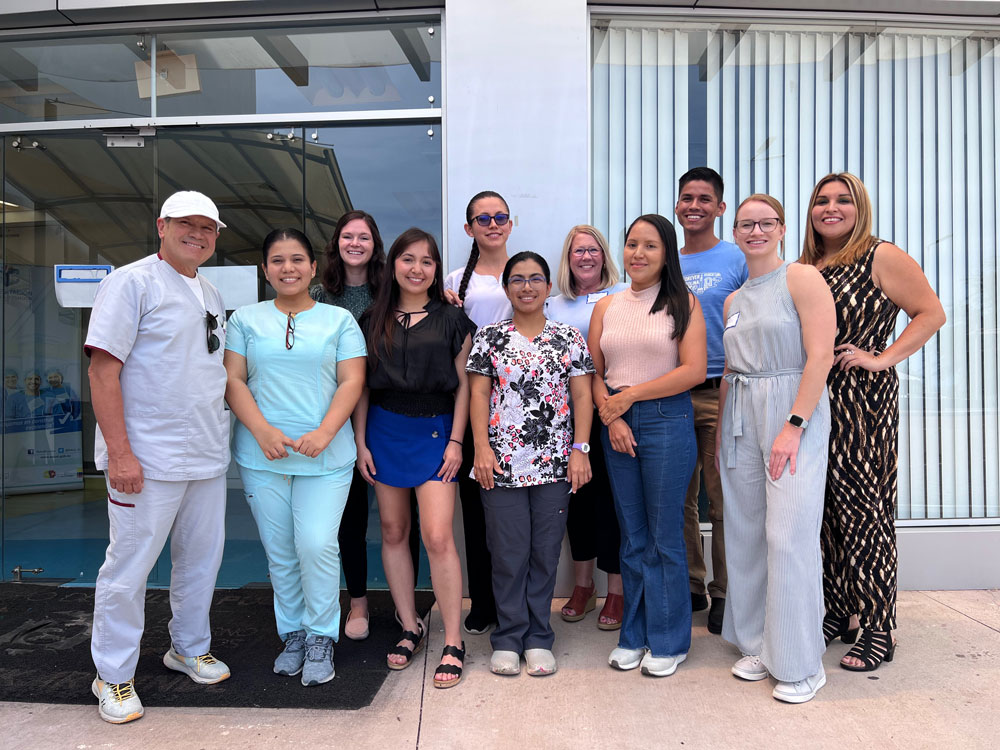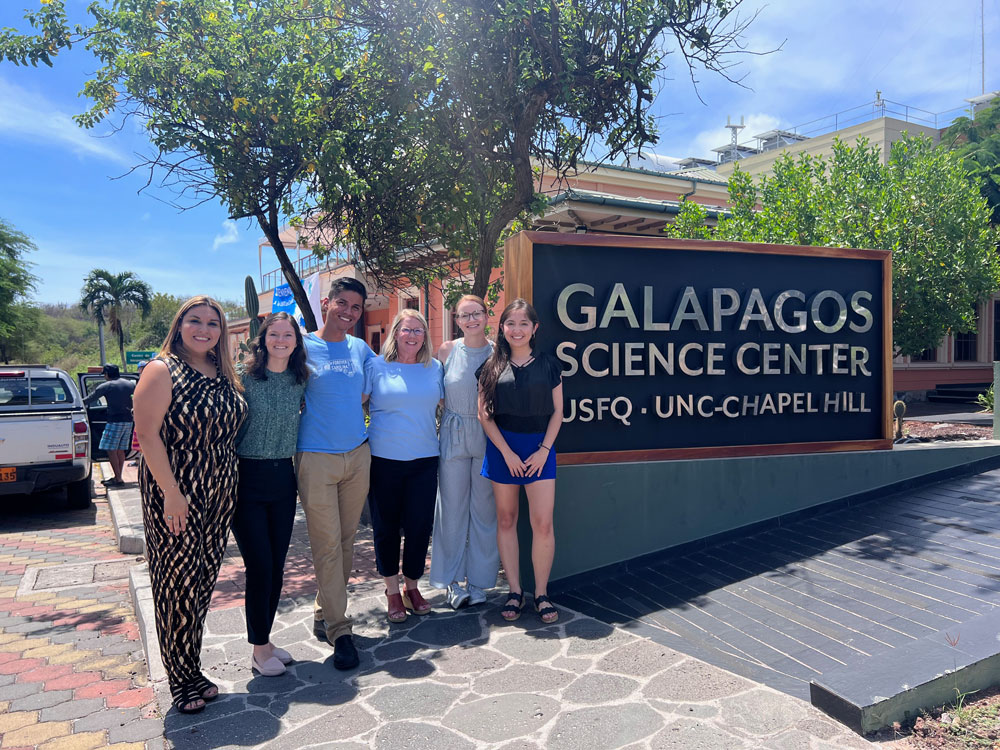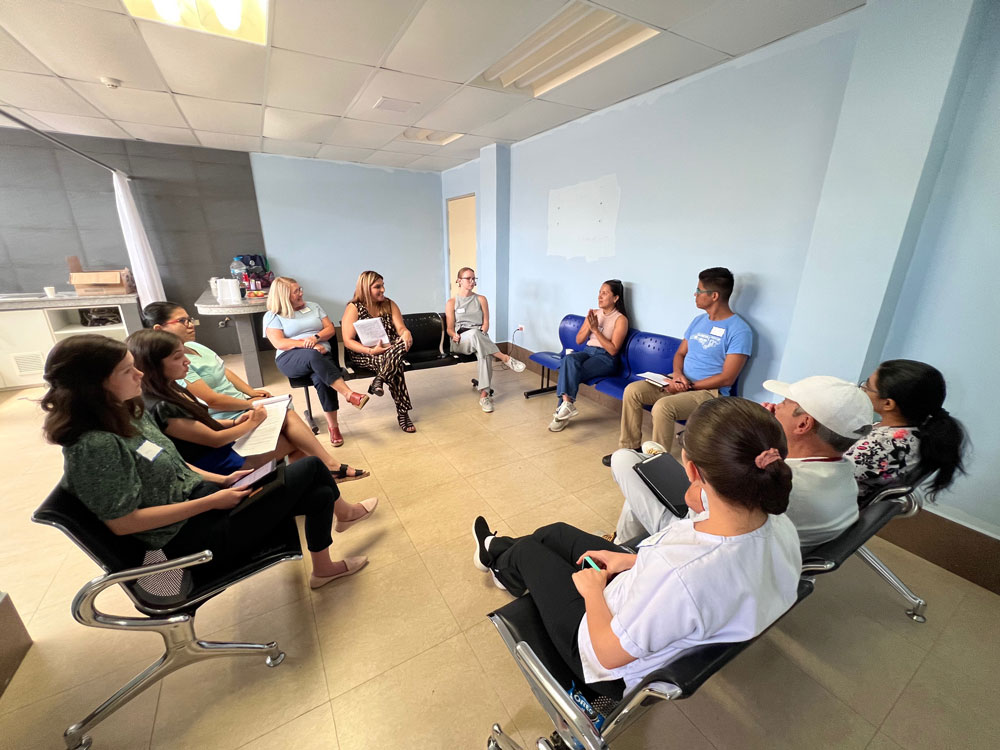This summer, UNC-Chapel Hill’s School of Nursing sent faculty and students to continue previous research on the professional development needs of nurses in the Galapagos, thanks to funding from the UNC Center for Galapagos Studies’ Seed Grant program.
The School of Nursing began a collaboration with the Universidad San Francisco de Quito (USFQ), Oskar Jandl Hospital on San Cristobal Island, Galapagos, and Ecuador’s Ministry of Public Health in 2016 to assess and address this issue. In their initial needs assessment, the partnership identified the need to provide nurses with continuing education through the hospital.
“Healthcare is continuously changing and evolving,” said the study’s principal investigator Dr. Megan Williams, a clinical associate professor at the School of Nursing. “We know that nurses need additional education, lifelong continuing education. Your learning does not stop when you graduate from your degree program.”

Research shows that professional development can significantly influence patients’ safety and quality of care as well as nurses’ job satisfaction.
“With the global shortage of nurses that’s happening right now, it’s so important to be thinking about how we can improve their professional development and education and overall job satisfaction so that we can keep the nurses here strong and getting the continuing education they need,” said Amy Kaiser, one of the School of Nursing students involved in the project.
Oskar Jandl Hospital, which is the main regional hospital for all Galapagos, does not yet have an effective program for this continuing education. Thus, the Academic-Practice Partnership for Professional Development (ADAPT) Study, which is funded directly through the seed grant program, was born.
“Nurses have a professional responsibility to engage in ongoing education, but hospital leadership must provide appropriate structure and support for continuing education to become part of the culture of an organization,” Williams said.
Williams, who is also a registered nurse, has research expertise in both nursing education and curriculum design. She is joined by two other School of Nursing faculty members, Dr. Ashley Leak Bryant and Dr. Natalia Villegas Rodriguez, and four nursing students, Lizbeth Arvizu-Benavidez, Brian Garcia, Dana Bjuro, and Amy Kaiser.
Williams explained that the purpose of this study is to both assess what nurses’ continuing education needs are, following up from the initial needs assessment in 2016, and to develop a comprehensive program to address these needs at the institutional level of the hospital.

The ADAPT study consists of three important stages. The first stage, which the researchers have already completed, was the quantitative part of the study. The researchers had nurses fill out a 25-question survey that asked them to identify areas of skills and tasks that they complete on a regular basis and indicate how competent they feel in executing these skills and tasks.
The second stage, which is currently underway, is qualitative. The research team is following up on the initial surveys by forming small focus groups in which to interview participating nurses. The team is focused on learning more about each of the nurses and their backgrounds, their work environment at the hospital, how they have been impacted by COVID, and how the research team can best support them. The team also asked the nurses to provide more detailed answers about which areas of skills and tasks should take the highest priority in the continuing education program.
The third and final stage will consist of an analysis of the results from stages one and two that will direct the planning of the educational program.

While the study is still underway, Williams has shared some of the team’s early findings. One important takeaway the team has found has been differentiating between areas of the hospital that are activated every day – the operating room, emergency services, and hospitalization inpatient care – and areas of the hospital that aren’t activated on a regular basis. These latter areas, referred to as “non-activated areas,” include critical care and the treatment of small infants; while they are less frequently activated, they deal with critically ill patients. The problem is that nurses aren’t regularly able to practice the skills unique to these non-activated areas and, thus, often feel unprepared to handle these areas of critical care.
This situation leads to increased stress for the nurses and also impacts patient care, so identifying this issue has informed the research team that the nurses need regular refreshing in these skill areas. Williams compared this situation to how nurses in the United States are required to complete a CPR refreshment course annually.
“So what we want to do,” Williams explained, “is create a program here in San Cristobal that will help the nurses stay up-to-date in their knowledge and their skills, especially for those times when those areas that are high-risk but low-frequency are activated.”

The details of this program are still in-progress as the study continues, and it will be a collaborative effort with the nurses to design a program with both their needs and resources in mind. Williams is excited about the potential in this collaboration.
“We’re really excited about partnering with the nurses,” she said. “They have the real-life experience, and we can create a program to help support them in their knowledge and building those skills and keeping those nurses feeling confident and competent in those critical care areas.”
This research project has also given the faculty and students the chance to work with and learn from the amazing nurses at Oskar Jandl Hospital, which has been an inspiring and educational experience for the whole team.
Arvizu-Benavidez, one of the nursing students, said, “It has been a great experience learning from the nurses, seeing nursing around the world, and it has truly influenced my passion as a future nurse.”
As a nurse with decades of experience, Williams added, “It’s nurse to nurse. We speak the same language: even though I’m not fluent in Spanish, we still understand each other. There’s just a camaraderie and a time that we can be a team doing what we do best, which is caring for patients and our communities.”
Written by Andy Little ’24, Center for Galapagos Studies Student Worker
